The Home Office is considering cutting international student numbers at UK universities by nearly half, Education Guardian can reveal. The threat is being greeted with dismay by university heads, who say some good overseas applicants are already being refused visas on spurious grounds.
The home secretary, Amber Rudd, pledged a crackdown on international student numbers at the Conservative party conference in October, to include tougher visa rules for “lower quality” universities and courses. But senior university sources are warning that the cutbacks could be far more severe than expected. They say they have seen Home Office plans that model slashing overseas student numbers, with one option to cut the current 300,000 to 170,000 a year.
The Home Office says a rumour it had modelled even more severe cuts of two-thirds, to 100,000 students a year, are “categorically untrue”. The rumour was discussed at private seminars last month by leading figures at the government’s Higher Education Funding Council for England.
International students bring more than £10.7bn to the UK economy, according to Universities UK, the vice-chancellors’ umbrella group. The head of one leading university, who asked not to be named, denounced the potential scale of the cuts as “insane”, adding: “politics is trumping economics”.
Prof Colin Riordan, vice-chancellor of Cardiff University, agrees: “The Home Office seems to have decided that cutting international students is the only way of delivering the manifesto target of getting net migration down to the tens of thousands. But it doesn’t address people’s concerns about immigration. The problems people are seeing on the ground are certainly not caused by international university students or staff.”
Vice-chancellors say some bona fide students are already being turned away after difficult “credibility” interviews, which can be part of the visa process. University heads are frightened of speaking out about these decisions in case it counts against future applicants to their institution, but have shared examples with Education Guardian:
An applicant was deemed not to be genuine because he did not know the university library opening times.
Another was excluded for not knowing the name of the vice-chancellor at his university – a test many would-be domestic students would certainly fail.
One applicant was refused a visa for “falling below the amount specified in a bank account by a couple of pounds on one day out of the 90-day period, even though his parents had huge funds and their accounts were also submitted”.
Another vice-chancellor says the judgments being made by UK Visas and Immigration have changed significantly in the past few months. Indian students, in particular, seem to be having a tougher time. “They are telling some students there is exactly the same quality of course available in India so why are you coming here,” one vice-chancellor says. “That is outrageous.”
Even if students proved they had sufficient funds, some interviewers were questioning whether the chosen subject was an “appropriate” use of students’ money. “Some applicants are being asked questions we would never ask a domestic student … about what they will be doing at 25 and 30 and what they will be earning at 40,” the vice-chancellor says. “This is all clearly designed to make the applicant reconsider.”
Sir Keith Burnett, of Sheffield University, one of the vice-chancellors who accompanied Theresa May on a recent trade delegation to India, says: “If we genuinely want to be open to the world and a global leader in free trade, we can only do so by welcoming talent. This cannot simply be our own assessment; international students need to feel welcome and that accessing the UK to study and for a period of work experience is easy. Even a hint that students are unwelcome and they will go elsewhere.”
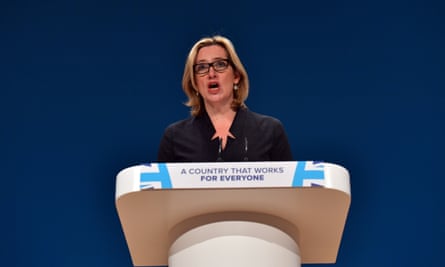
He says other countries, including Australia and Canada, are already benefiting from the government’s “deeply damaging” current position, by welcoming excellent international students who will go on to secure leading jobs and be lasting allies of their countries.
“Our great British universities are great precisely because they are international – and we urgently need the government to recognise this, to honour the enormous benefit international students bring to the UK,” he says.
Abhinav Paul Kongari, from Jharkhand, India, is studying mechanical engineering at Sheffield University and says it is the best decision he has ever made. “I wanted really good work experience while I was studying,” he says. “And the system of education in the UK, and especially engineering, is much better than in many other countries. I was really excited that I could engage in research early on, too.”
He adds: “I’m hoping to use the knowledge I’ve learned helping make people’s lives easier in undeveloped countries like India or South America. But I want to retain my links with Britain.”
In her party conference speech Rudd said the government wanted to help “the best universities – and those that stick to the rules – to attract the best talent, while looking at tougher rules for students on lower quality courses”.
There is anxiety in universities that the Home Office may rely on the Teaching Excellence Framework – the government’s new league table – to decide which “lower quality” institutions and courses to cut. Vice-chancellors warn this could have shocking consequences as some world-class research universities, including the London School of Economics, Bristol and King’s College London, are not predicted to score well in the new “gold, silver and bronze” rankings.
Rudd’s reference to universities that “stick to the rules” is widely thought to be a signal that the government will also crack down on institutions and courses with higher visa refusal rates. Under current guidelines universities will lose their licence to recruit international students if more than 10% of the students they recruit are refused visas. Two senior university sources said the Home Office was considering reducing this to 7%, and had looked at dropping it to 4% or 5%. A number of institutions could fail if the bar were this high.
The Home Office said: “Claims the Home Office is modelling cuts to reduce international students to a third [ie 100,000 a year] are categorically untrue. We want to strengthen the system to support the best universities – and those that stick to the rules – to attract the best talent. The British people have sent a clear message that they want more control of immigration and we are committed to getting net migration down to sustainable levels in the tens of thousands.”
Riordan says shifting the visa rules is unnecessary. “There is already a system that is stopping any abuse. If they are refused a visa, they aren’t coming here, so where is the problem?”
This article was amended on 12 December to remove a line at the request of the Home Office.
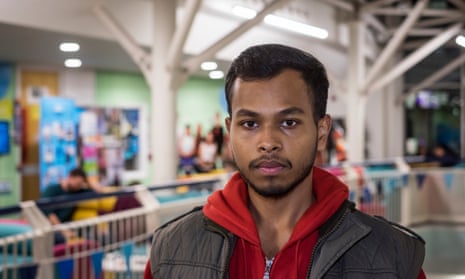
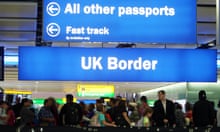
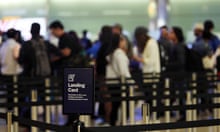

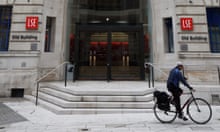



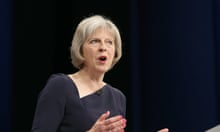
Comments (…)
Sign in or create your Guardian account to join the discussion